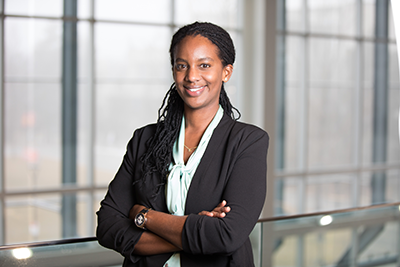Purdue Online Alumna Credits Interdisciplinary Engineering Degree for Academic and Professional Success

For Philippa Ngaju, the decision to go back to school to pursue a master’s degree in engineering was motivated by a desire to fundamentally transform access to quality healthcare in parts of the world where healthcare infrastructure is scarce. When Ngaju started researching master’s programs, she was already well on her way to transforming healthcare outcomes in her home country, Uganda. She was in the middle of planning a clinical trial for a critical medical device she and a team of other researchers had developed: a low-cost infusion pump capable of delivering life-saving intravenous medicine at a controlled speed.
Ngaju knew that she needed a master’s program with fully online course options that would allow her to continue her important work at the Uganda Industrial Research Institute. She also needed a program that had the prestige and research expertise she needed to support further development and adaptation of her Electronically Controlled Gravity Feed Infusion Set device, plus the program needed to be flexible enough to accommodate her continuing to live and work in Uganda. At Purdue, she found that and much more.
“Purdue was a no-brainer, really,” Ngaju said. “It’s a powerhouse in engineering, with very well respected faculty who have extensive research experience. It was an easy top-choice.”
To accommodate her busy work and research schedule, Ngaju chose to pursue a master’s degree in Interdisciplinary Engineering from Purdue University Online. The fully virtual coursework was rigorous but flexible, giving her the leeway she needed to continue planning clinical trials for her infusion pump device — an invention that she knew would have a big impact on Ugandans, particularly Ugandan children.
“I knew the device would have a major impact on healthcare in Uganda, and so it was really important to me to continue working on this project while seeking out new skills,” Ngaju said. “Purdue gave me the freedom to do that.”
Prior to starting at Purdue, Ngaju had never taken a virtual class, and she didn’t know what to expect. Though the time-zone differential between her and many of her classmates was challenging, she found that her professors at Purdue were accommodating of her schedule, and she was able to complete the courses at her own pace.
“The professors were very accommodating to online students,” Ngaju said. “The time difference could make it challenging to meet with other students, but we had a WhatsApp group that helped me stay connected to everyone and allowed me to have a team I could work with on my own schedule.”
At Purdue, Ngaju was able to collaborate with other online students on projects and course assignments, which made her feel connected to the campus community despite being several thousand miles away from West Lafayette. She also found that her professors were very supportive of her research goals and professional endeavors, including the infusion pump invention she was spearheading into a reality.
Creating Innovative Solutions to Healthcare Problems
Overall, the courses Ngaju took in her master’s connected seamlessly to her professional goals, and she credits her experience at Purdue with giving her the confidence and skills she needed to take on new roles within the healthcare field. After graduating from her program in May 2020, she accepted a new job as a Specialist, Health Innovation leading health innovation programs at the University of Calgary in Canada. In this role, she is required to provide advisory for life sciences startups that includes guidance on regulatory compliance and market entry for medical devices. At Purdue, she was able to take some regulatory science classes that gave her a strong foundation in how to approach compliance issues in healthcare.
“I learned a lot of new skills,” Ngaju said. “I learned what it takes to file a patent and scale a medical device, which helped me prepare my device for pediatric clinical trials, and it’s helped me in my current career.”
Ngaju’s experience at Purdue also helped inspire her to take another giant leap towards making innovative changes in healthcare. This coming fall, she will be pursuing a PhD in Biomedical Engineering from the University of Calgary. Some of the electives she took at Purdue helped prime her for the research she wants to complete as a PhD student.
“I took some electives in biosensors and microelectromechanical systems, which was definitely a very good base for the research that I hope to do in my PhD,” Ngaju said. “I hope to focus on diagnostics for infectious diseases and some of those courses are essential to doing in-depth research in those areas, so [Purdue’s program] helped me write my PhD research proposal.”
After earning her PhD, Ngaju hopes to continue to create more innovative healthcare solutions like the Electronically Controlled Gravity Feed Infusion Set. She wants to build effective point-of-care diagnostic tools that can be used in parts of the world that lack infrastructure and trained personnel to conduct medical tests. Tools like these are vital in places like Uganda, where there are still many inequities when it comes to accessing quality healthcare.
“My Master’s degree definitely laid the stones for me accomplishing my future goals,” Ngaju said. “Basically, I want to understand what about this really complex system is broken, and how we can use technology to create sustainable solutions that will transform the system in the long run.”
Learn more from other trailblazing Purdue Engineering alumni and explore what you can do with an online master’s degree in interdisciplinary engineering at the program’s website.
Writer: Rachel Barton, barton53@purdue.edu
Source: Philippa Ngaju Makobore, pngaju@purdue.edu
